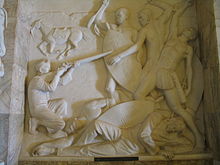Piet Uys
| Piet Uys | |
|---|---|

|
|
| Born |
October 23, 1797 (bapt.) Potberg, Swellendam district |
| Died | April 11, 1838 (aged 40) Italeni, UmGungundlovu |
| Resting place | Uysdoorns, Pietermaritzburg reburied: Weltevrede, Utrecht |
| Residence | Krommeriviermond and Onder-Boesmansrivier |
| Occupation | Commandant |
| Successor | Jacobus Johannes “Cobus” Uys, younger brother |
| Spouse(s) | Alida Maria Uys |
| Children | “Kruppel” Koos (1819–1886) Dirk Cornelis (1823–1838) Petrus Lafras “Piet Hlobane” (1827–1879) |
| Parent(s) | Jacobus Johannes “Koos Bybel” Uys (1770–1838) Susanna Margaretha Moolman |
Petrus Lafras Uys (more commonly known as Piet Uys) (1797–1838) was a Voortrekker leader during the Great Trek.
He was born in Swellendam, the third son (of six) of Jacobus Johannes Uys (nicknamed Koos Bybel (Bible) because of his religious beliefs). In 1823 Piet Uys moved to a farm in the Humansdorp area near Uitenhage together with his father.
Uys married a cousin, Alida Maria Uys, in 1815. The couple had three sons. He was described as a "well-spoken, intelligent man" with a wide circle of friends, including the Governor of the Cape Colony, Sir Benjamin d'Urban and Colonel Harry Smith. His conduct during the Cape Frontier wars led him to assume a leadership role at the relatively young age of 37. As a result of this, Uys was chosen to lead the "Commission Trek" to Natal in 1834, where he visited Port Natal and may also have met Dingane.
After this successful scouting expedition, the party returned to Uitenhage in February 1835. The subsequent favourable reports of the Commission Treks resulted in many farmers leaving their farms and trekking into the interior of Southern Africa, in what later became known as the Great Trek. Uys sold his own farm in December 1836 and left the Uitenhage area with his party of 100 Voortrekkers (as they became known) in April 1837.
On 29 June of the same year, the Uys Trek arrived at the combined Voortrekker laager at the Sand River where, unbeknownst to them, Piet Retief had been elected Governor and a constitution drafted. Uys refused to accept either and insisted that, once they had reached Natal, democratic elections should be held. He also proposed a constitution based on that of the United States of America.
...
Wikipedia
